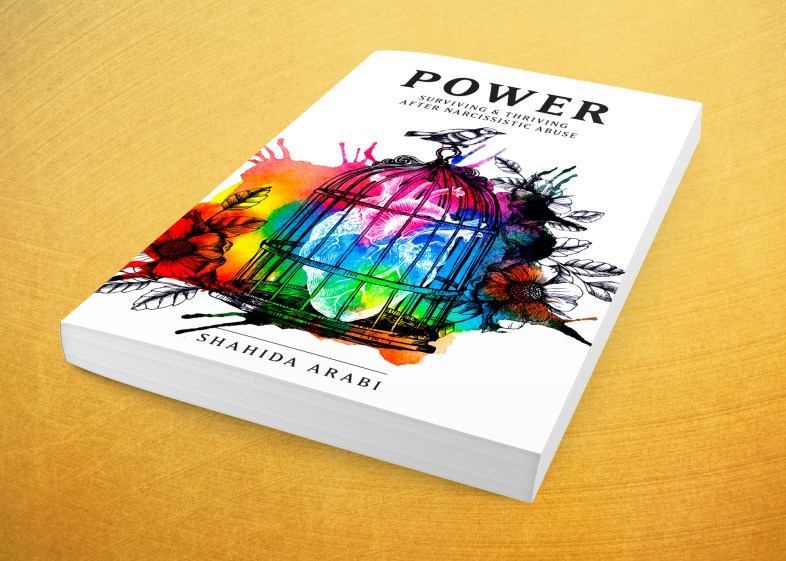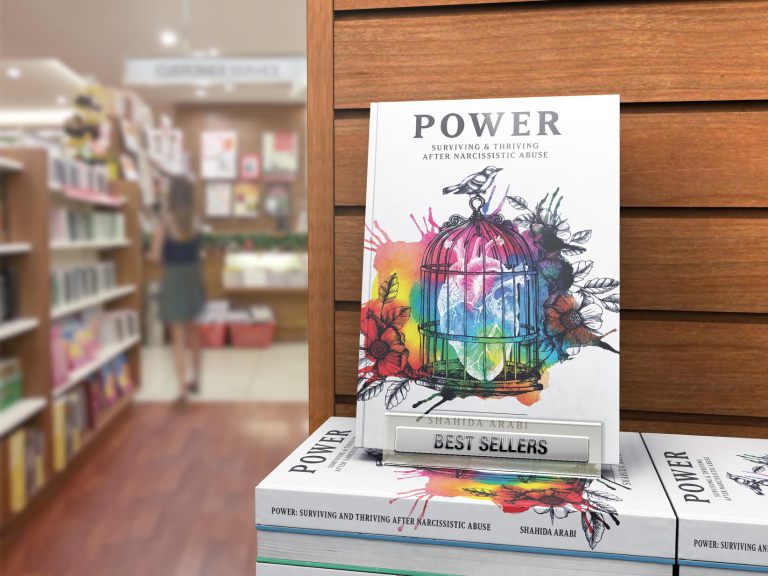Survivors of intimate relationships with malignant narcissists are often put through the psychological wringer. This is not surprising, as they have been chronically mistreated, demeaned and diminished by character-disordered individuals who are masters of interpersonal exploitation and who show severe deficiencies in their ability to empathize. Dr. George Simon asserts that grandiose, malignant narcissists feel entitled to abuse and exploit empathic individuals for their own gain because they truly believe in the delusion of their own superiority.
Abusive narcissists are contemptuous, haughty, condescending and cruel beyond words. They are also insatiable attention-seekers, constantly looking for validation from the outside world to bolster their grandiose egos.
We’ve all heard the saying, “Never trust the date that is rude to the waiter,” but what about the partner who is overly flirtatious with the waitress, each and every time? Survivors of intimate relationships with narcissists can attest to the insatiable attention-seeking that a narcissistic abuser exhibits as he or she tries to gain narcissistic supply (ex. attention, praise, admiration, sex, status, etc.) from anyone and everyone they meet.
TOXIC TRIANGULATION – WHAT IS IT?
This leads us to talk about one of the common ways malignant narcissists demean their victims and retain narcissistic supply: triangulation. Triangulation in the context of narcissistic abuse is the act of bringing another person or a group of people into the dynamic of a relationship or interaction to belittle the victim and make the victim “vie” for the attention of the narcissist.
This method is often used to create love triangles among the people that the narcissistic abuser depends on for his or her daily “fix” of attention. Triangulation is one of the most insidious, heartbreaking tools malignant narcissists use to manipulate their former partners, their current partners, their harem members as well as their new sources of supply.
Narcissists enjoy using triangulation as a mind game that enables them to gain a sense of power and control over multiple people simultaneously. It confirms to them their own grandiosity – after all, aren’t they superior if they have all these people competing for their approval and validation? They certainly think so.
The ways narcissists triangulate include but are certainly not limited to: flirting with others in front of their partners, emotional and physical infidelity, as well as comparing their partners to others as a way to manufacture insecurities in them. They may also report back falsehoods about what one person is saying about another, in order to pit their victims against each other so that neither one of them approaches the other about the abuse taking place.
This form of triangulation can enables victims to doubt the reality of the abuse (ex. “My ex never had this problem with me!”) and serves to make the victim feel unworthy and doubtful of their own experiences. As survivors who have met the ex-partners of their narcissistic abusers and have had honest conversations with them can testify, these claims are far from the truth. You will find that malignant narcissists deplete and drain each and every one of their victims, who all have similar horror stories about the relationship.
Triangulation also has the added “reward” of allowing narcissists access to resources from each and every victim – whether that resource be wealth, status or simply the delicious compassion of an unsuspecting empath. The need for narcissistic supply can be almost gratifyingly sadistic – a way to punish victims for seeking to be independent agents and to keep them reliant on the narcissist’s approval.
You may be wondering: why would anyone fall into this trap? It’s because triangulation can happen in covert, underhanded ways meant to subtly make victims question themselves. The narcissist’s false mask helps to reinforce his or her charming presence, which lures both potential victims as well previous partners into a horrific abuse cycle filled with love-bombing idealization, cruel and callous devaluation and a comfort-punishment dynamic that creates trauma bonding between victim and predator.
What survivors must understand is that triangulation is not an indication of anyone’s worth or desirability. Nor are the narcissist’s new victims immune to encountering this tactic. It is ammunition and leverage to devalue former victims to new partners (ex. “My ex was so crazy!”) or re-idealize old partners while devaluing new ones (ex. “My last girlfriend/boyfriend got my jokes, why can’t you?”). It is also used to annihilate a former partner’s sense of self by flaunting the new source of supply shortly after a discard.
This is something narcissists are prone to doing publicly post-breakup, especially if you discarded them first. It is done in order to regain power over your emotions, hoover you back into the abuse cycle or provoke you into breaking No Contact.
How to Heal from Triangulation
There are many excellent resources in the survivor community about the methods of triangulation and its effects. What is lacking are more tips on how to best address the wounding that can result from triangulation and how to begin healing from it. Rejection on its own is hurtful enough, but manipulative, deliberately damaging comparisons set up by an emotional terrorist is quite another affair.
This can be a complex and daunting undertaking, as narcissists not only trigger old wounds, they also manufacture new ones – creating what I like to call “simultaneous wounding.” It is important that in resisting triangulation, one minimizes as much contact as possible with the narcissistic abuser (even in a co-parenting situation where Low Contact is more appropriate). This entails blocking the abuser on all social media platforms, cutting off contact with the abuser’s harem members to ensure peace of mind as well as taking any steps you can to legally protect yourself from potential stalking and harassment after the break-up.
Healing from the effects of toxic triangulation is not an easy task, but gaining self-mastery, self-confidence and learning how to self-validate is essential to the recovery journey. You may also require professional support to address any symptoms of trauma in addition to these methods, as well as any other traditional or alternative healing modalities that can assist you in the healing journey.
Here are three powerful ways survivors of abuse can begin to heal from the impact of toxic triangulation and rise in their authentic, glorious selves:
1. Know that you are irreplaceable and learn exactly why.
Toxic partners work hard to instill in us a belief that we can be easily replaced with another source of supply. This is why survivors of narcissistic abuse can be so devastated after they’ve been abused, devalued, discarded and not too soon after, seemingly replaced by a shiny new target. They reminisce about the ways their narcissistic partners treated them in the idealization phase, wondering if the new person in the abuser’s life is being treated better.
We all know logically that narcissists put each and every partner through this cycle of abuse regardless of who that person is. The fantasy relationship they display on Facebook or in public spaces is an illusion – you know that for a fact because they concocted the same fantasy with you, posting happy images on social media or bragging about you to their friends even when they began abusing you behind closed doors.
The abuser’s lack of empathy and sense of entitlement carries forward in every relationship – even the person they eventually seem to ‘settle down’ with (and let’s all say a collective prayer for this person). Yet on a subconscious level, we may still be plagued by victim-shaming ideas cultivated by the blameshifting, projection and gaslighting that we endured throughout the relationship.
Our abusers, after all, have brainwashed and conditioned us over time into believing that we were the problem, and this is an ingrained belief system that needs to be addressed at its core in order for healing to take place.
It is this belief that arises not only during toxic triangulation in the relationship, but after the ending of it. Not only do trauma bonds with the narcissist need to be severed, our cognitive distortions need to be replaced with healthier, more realistic beliefs about the toxic nature of the narcissistic ex-partner, the reality of the abuse we experienced as well as the integrity of our identity that the abuser attempted to erode, erase and diminish.
That’s where the power of self-appreciation and self-validation come in. Combating triangulation requires knowing that you are truly irreplaceable and why. I am sure you’ve heard it before, but the fact of the matter is, your particular “package” cannot be replicated. The dynamic combination of your unique inner and outer beauty, success, talents, skills, can never be found in another.
Remember also that narcissists see their victims as objects, not as individual beings, making them unlikely to even appreciate the complexity of the various identities they work hard to erase. Additionally, you as a person can never be ‘copied.’
It is interesting to note that narcissistic abusers may also triangulate their victims with targets that are “surprising” to say the least – people that victims did not realize the narcissist would ever have an interest in due to the narcissist’s so-called “preferences.” This can get us wondering whether the narcissist even liked our “type.” The truth is – the narcissist’s preferences quickly go out the window because they are overridden by the need for supply. It is just further evidence that narcissists don’t discriminate when they need sources of supply after the ending of a significant relationship…they’ll gain attention, praise, adulation and validation from whoever offers it to them.
The fact that the abuser has seemingly ‘replaced’ you only means that they have replaced you with who they see as yet another object to cater to their needs. They do not see their new sources of supply as human beings nor do they truly appreciate the intricacies of who they are beyond a shallow representation.
The narcissistic abuser is so self-absorbed that they rarely ‘know’ the true personalities of their victims – only the aspects that can be used to serve them and their image. They may know that their partner Sally is a talented, good-looking musician, but they don’t truly ‘know’ Sally as a person. You’ll discover that even after a long-term relationship, asking a narcissist what they liked about their ex-partner will elicit only baffled looks. Even asking a narcissist what they like about you while in the idealization phase will only result in shallow responses. That’s because throughout the abuse cycle, the narcissistic abuser focuses on the traits of the victim that could be used to prop up the narcissist’s ego – not on the deeper qualities that defined who they were. Therefore, it is a waste of time to ever compare yourself to a narcissist’s old or new sources of supply or their harem members.
This can be difficult to accept when the narcissist is pulling out all stops to create a happy public image of his or her new or old relationship – but remember that appreciating what makes you who you are can act as an antidote to their poisonous efforts to diminish you.
HOW TO STOP IDEALIZING THE NEW SOURCE OF SUPPLY.
When a narcissistic abuser moves onto a new target, survivors may begin to ‘idealize’ the target! They may begin to compare themselves unfavorably with the new source of supply, nullifying who they are in the process. They forget that they can never truly be replaced – with anyone. Sure, narcissistic Brad can date new target Melissa who is attractive and sporty, but they can’t get you. Not only are you attractive, you may also be intellectual, have a successful career, a passion for helping others, a quirky sense of humor, and a penchant for making the best dirty jokes. You could be a head-turner on the dance floor, be financially stable, deeply spiritual and have an active lifestyle. What are the cool and interesting things you’re forgetting about yourself? There are so many incredible things about you and your life that you tend to dismiss or minimize because you’re so busy focusing on the new victim.
You have all sorts of quirky facets to your identity that fit together in a scrumptious way that frankly, no one could mirror even if they tried. Maybe I am drawn to Cory with the six-pack and smooth pick-up lines, but at the end of the day it might be Zach with the sweet smile, who is not only smooth but also emotionally validating, empathic, mature beyond his years and has a deep voice that would probably make me melt in the long run.
Attractiveness is not a one-dimensional thing: it is a kaleidoscope of factors. It is not just one or two qualities that define us and make us desirable to people. It is a whole spectrum of nuanced attributes and larger-than-life traits that are stirred to make the magical potion that is your essence.
Everything from your intelligence, passions, hobbies, interests to the twinkle in your eye – beautiful qualities and attributes that anyone who is not a narcissist will be sure to cherish about you. So ask yourself: what is the potent cocktail of qualities that make you extra delicious and irreplaceable?
I am serious – there is something absolutely yummy about your particular mind, body and spirit – about your soul. There are parts of us – sometimes even the very ones we’d rather hide from society – that make us unique in ways people wouldn’t expect. Maybe the way you laugh is captivating; there might be something about your energy that is magnetic or your strong stride that catches the eye of everyone in the room. People pick up on those things about you because they’re seeing you with fresh eyes – and now it’s time for you to value these things in yourself too.
Remember, this rule of people being multifaceted applies to your abuser too, but in a way that gives survivors the advantage in moving forward. The once appealing and charming narcissist gets pretty boring in the long run when we factor in the attributes of their true selves – their flat affect, their inability to be happy for others, their cruelty, their pathological envy and a number of other undesirable traits. Who are they to compare or triangulate your badass self to anyone? No one.
That is why it helps, after we’ve addressed any wounds left behind by blameshifting, to cultivate and reinforce our own strengths rather than needlessly emphasizing any perceived weaknesses, flaws or deficiencies that the abuser has pushed us to internalize. It is a waste of your beautiful, divine self to diminish or nullify your qualities just because of the petty and immature games that narcissists play. I find that when survivors of narcissistic abuse begin to compare themselves to new targets or old ones, they begin to feed right into the narcissist’s desire to see their survivors sabotage themselves. It’s emotional rape and murder without a trace – and it’s done by your own hand!
Here are some ideas on how to embrace our irreplaceability and celebrate ourselves:
Make an epic “love list” and refer to it daily. This will get you in the habit of waking up in the morning with an attitude of being grateful for all that you are and have, rather than feeling lacking in any way.
What sort of miracles in your life, in your personality and in your abilities could you be missing out on as you waste time comparing yourself to another person? This is all about moving forward with the determination to refocus on what you do well and to celebrate the most attractive and desirable qualities about yourself. Every day, honor the qualities, traits and attributes that you are proud of – even if the narcissist put them down.
What successes did they downplay? Reminisce lovingly about them, knowing that the reason they were diminished in the first place were because they evoked the narcissist’s pathological envy. What intellectual, spiritual, emotional and physical attributes do you find people most notice about you and are captivated by? Your abuser probably tried to idealize you with them, only to later devalue them so that you wouldn’t feel as confident about yourself or your ability to get a better partner. Now it’s your turn to see these qualities again with fresh eyes. What do you see within yourself that you know makes you special and unique? Make an entire list if you have to, about the things you like and love about yourself and your life. Also make another list for your goals, dreams and anything you want to enhance in your life and brainstorm the steps to do so (such as your existing financial success or good health).
Tackle things that you need to breed more confidence in head-on. Use whatever the narcissist diminished you in as motivation or fuel to celebrate, improve or enhance loving that specific part of yourself.
If you have insecurities about your appearance, do some heavy-duty mirror work each morning and night before going to sleep. Find joy in the various characteristics that make you beautiful and breed acceptance for any perceived flaws. What you might see as a flaw, another person might see as a treasured part of you. If you find this exercise difficult, start with staring into your own eyes in the mirror and saying, “I love you and I care about you, and goddamnit, I am going to fight for you. You are THAT worth it.” If you struggle with harmful messages about your body, do some yoga to increase appreciation for what your body is capable of rather than engaging in judgments about what it looks like. You will find that when you focus more on appreciating and honoring your body, you’ll also begin to treat it more mindfully and everything else you want will fall into place naturally.
According to research, yoga is also helpful for releasing trauma from the body – it’s a win-win! You may also want to engage in daily exercise to release endorphins and increase an overall sense of joy and well-being – meeting your fitness goals will just be the icing on the (gluten-free?) cake. If your narcissistic abuser insulted your intuition or intelligence, get mindful and attend a meditation workshop to reconnect with your sacred inner guidance or pursue any academic goals you put on the back burner – ones that reconnect you with your brilliance. Those are just some ideas for how to use the bullying messages of your abuser to get you moving in a positive direction.
Don’t hold back on celebrating yourself – even if the voices of society, your abuser or your own inner critic seems to interfere.
If you normally shy away from complimenting yourself, it’s time to heap on some healthy self-appreciation and self-praise. If you’re one to belittle or judge everything you do or say, it’s time to take a step back and observe the inner critic without engaging the negative self-talk or feeding into it. You may think that I am asking you to get somewhat “narcissistic” in the process of loving yourself – but don’t worry, this is not about being cocky, shallow or self-aggrandizing like the narcissist is prone to being. It’s about appreciating yourself more fully and increasing your sense of self-efficacy, power and agency. It’s about recognizing your own desirability (inside and out) and foregoing the dark voices of your abusers and bullies saying otherwise. It’s about owning your strength and your ability to validate who you really are, not what the abuser tried to make you out to be. If the voice of your abuser arises and tries to squash your burgeoning confidence, learn how to distinguish that voice from those who truly love and care about you. Check in with yourself and say explicitly, “That’s not what I truly think and feel. That’s what the abuser tried to make me believe about myself.”
Do something to ‘interrupt’ the pattern of negative self-talk and get yourself back into the habit of nourishing yourself with empowering affirmations.
Think of hypercritical feedback from the narcissist as criticism from an angry, jealous toddler – it is not valid nor has it been given to you with the best intentions. It is a pathological defense mechanism and has very little to do with your worth or value. Realize that feedback from grounded, emotionally stable individuals as well as your own inner voice are the anchors and true testaments to your character and potential.This is all about getting the focus off of the narcissist and onto the magic that is within you.
Pull in some healthy external feedback when you need to and distinguish it from the harsh words of your abuser.
These exercises are all about what you enjoy in yourself, but don’t be afraid to also pull in positive feedback from healthier past partners, friends, family members, co-workers and acquaintances about what they cherish and positively regard about you as well. Keep a running document of any and all compliments you’ve ever received in your life that you can refer to whenever you’re feeling especially low or find yourself getting into a space of self-doubt.
2. Eradicate subconscious wounding that says you’re not enough and cultivate new seeds of self-worth.
Many (but not all) survivors who have been in unhealthy, abusive relationships in adulthood also come from unhealthy family dynamics. Childhood is where many survivors first learn to dim their own light.
Survivors of childhood abuse by narcissistic parents may have been pitted against a sibling or a group of siblings growing up. Your parents may have tried to “bury” your gifts because they were abusive narcissists and wanted to see you fail. They knew your potential, but they worked hard to stifle it to meet their own selfish agendas.
That being said, there are a variety of circumstances that can lead to a child growing up believing that he or she is not meant to shine. Maybe you always had a more athletic brother or a “prettier” sister (at least from society’s perspective). Perhaps you had a best friend that tended to outshine you in social circles. It’s possible you were bullied or were made to feel invisible by toxic teachers who paid more attention to their favorite students. You may have also endured complex trauma and were the victim of all of these scenarios and more.
Whatever your situation was growing up, even if it was a healthy and happy childhood where you were nourished and supported, there may still be beliefs lingering about not being good enough – whether it is from the influence of society, culture or childhood programming. Identifying these experiences and the associated beliefs that came with them can go a long way in tackling any wounding that is being reinforced when triangulation is used as a method to provoke or further diminish you.
After you’ve identified the ways in which you have been brought down in the past, ask yourself the following questions and explore:
In what ways can I embrace my visibility? For example, is there a dream you’ve been holding off on pursuing due to self-doubt or sabotage from your abusive partner? Now is the time to start working on or rebuilding that dream to make it come to life, bigger and brighter than ever – it represents an authentic desire you’re meant to fulfill.
What parts of myself and what gifts have I resisted showcasing as a way to hide myself the way I’ve been taught to hide? We were taught to minimize our talents and desirable traits due to the pathological envy of the narcissist and their put-downs, as well as any childhood programming. Perhaps you’re an incredible artist and your abuser told you negative things about your potential for achieving your dreams because it took the spotlight off of them. Now it’s time to embrace those again and remember the gifts that made us who we truly were before the abusive relationship.
What ways has being invisible protected me from what I’ve been taught to fear (such as criticism) and how can I cultivate the type of confidence that allows me to overcome those fears? Childhood abuse survivors can learn to fear success of any kind due to being punished for daring to succeed by their their abusive caretakers. Similarly, survivors of narcissistic abuse in adulthood can be taught that with success comes punishment via the callous put-downs of their intimate partners whenever they were daring to achieve something that enabled them to become independent of the narcissist. You may have developed an extreme fear of ‘displaying’ who you are as a person and the things that make you truly special. Beneath this fear is an underlying need to protect yourself.
Perhaps your five year-old self still fears being noticed by others because your abusive mother taught you weren’t worthy of being acknowledged or instilled a deep fear in you about the dangers of being too pretty or smart. Or maybe your 23-year-old self is still reeling from that abusive ex who told you that you were too ‘damaged’ to find anyone better – this is a common fear these toxic types try to convince their partners of in order to hold them back from pursuing healthier relationships.
Suppressing or acting on these fears might have been a go-to coping mechanism for you, but now it’s time to unravel these fears and invite curiousity about what they are protecting you from as well as what they’re preventing you from obtaining. These lingering fears may come with protective intentions, but they are ultimately holding you back from what is meant to flourish within you.
How can I rise above the people who tried to keep me behind the curtain, when I really deserved my chance at the spotlight too? If you find yourself fearing criticism or envy from others as a result of outshining them, remember that everyone deserves recognition – and that there’s plenty of it to go around. Unlike predatory narcissists, survivors of abuse know deep down that they don’t ever have to rob someone else of their light in order to be seen.
We can celebrate the accomplishments of others as well as our own – in fact, we take special joy in it. So why not extend that same courtesy of being happy for others to ourselves? We don’t have to be made to feel ashamed or guilty about being proud of who we are. What are more ways you can allow yourself to be in the spotlight and truly enjoy yourself? For example, your abuser may have pushed you to be quiet in social groups whenever you were with them so you wouldn’t get attention from anyone else – now is the perfect time to relearn how to speak out and show off your personality.
Here’s a truth-bomb for the people-pleasers out there: you’re allowed to take up space and own that space without apologies. You’re allowed to speak your voice. You’re allowed to be beautiful (or handsome) inside and out, brilliant, worthy, valuable, seen and heard. You’re allowed to be successful and be proud of yourself in a healthy way. You’re allowed to accept compliments. You’re allowed to compliment yourself. You’re allowed to set boundaries and say “no” when you mean no and say “yes” to the things your heart and soul say “hell yes” to. You’re allowed to realize that the narcissistic abuser who put you through this mess is just another incredibly flawed (and dysfunctional) human being who has no say on your worth or abilities. You’re allowed to see the new source of supply as also another flawed human being who is not worth any of your time, energy or competition.
Yep, you heard me. You never have to compete with anyone – and a healthy partner would never want anyone who they truly love and cherish to feel like they’re competing with anybody anyway. Narcissists want us to compete for their love and attention but what we’re pulled in to fight for is ultimately meaningless, as narcissists don’t even have the capacity to love anyone in a healthy manner.
Let the new source of supply get the consolatory prize: the abusive narcissist who will make them compete with others too – while you move onto bigger and better things. Your biggest prize is your new life of freedom and a path back to your true, authentic self – and, if you’re looking for it, an open space for true, authentic love to enter your life – the kind with empathy, compassion and respect. The kind that is so deliciously appreciative of everything that makes you so beautiful and worthy.
3. Minimize unnecessary comparisons and reprogram negative self-talk.
One of the most damaging lies we can learn from narcissistic parents or partners is that we have to compete with others in order to prove our worth. Whether it be the golden child or the new source of supply, victims of narcissistic abuse are made to feel deficient and worthless by the toxic, destructive conditioning of the relationship. They begin to compare themselves to others as a form of self-sabotage, continuing the abuse even after the relationship has ended.
If we spent our lives comparing ourselves to every person we came across, we would drive ourselves certifiably insane. Similarly, the last thing we want to be doing on our journey to healing is to make unnecessary comparisons to someone a toxic person has triangulated us with.
Narcissistic abusers are masters of triangulating us with people who may be very different from us – this is done intentionally to provoke a sense of unease and self-questioning about qualities we may “lack.” Yet what you have to remember is that down the line, your narcissistic ex-partner will start to compare their new supply to you – talking nonsense about how their ex (you) did this or that and suddenly putting you back on the pedestal.
They don’t discriminate on who they criticize and for what – they’re looking to feed off of the emotional reactions they get with all of their sources of supply and they will continue the same cycle of triangulation with their new partners as well.
The truth is that we are not lacking in any shape, way or form. We are “full” of the very things we need. We are absolutely sufficient in what we have now, because within that unique brand of quirks, flaws, strengths – is exactly who we are and who we need to be. We are already whole and we need to work on the negative self-talk and inner critic that may pounce to detract from our own wholeness.
There are many ways to reprogram this negative voice in your head. Some ideas might be:
- Engaging in a daily habit of positive affirmations customized to your unique needs and triggers. This is especially helpful when your abuser’s voice comes up. You may want to record these affirmations in your own voice and play them back (or have a trusted, loving friend do these for you). If you have severe anxiety over hardcore affirmations, start small. Maybe you don’t start with “I am beautiful,” but begin with “Everyone has beauty and I have beauty in me too.” instead. Do whatever it takes to make the affirmation believable to you before moving onto bigger and better confirmations of your value.
- A weekly meditation practice (best to do this on a day you are most vulnerable to cravings to break No Contact) to help you to listen and observe your train of thoughts rather than become increasingly reactive to them. Mindfully approaching these cravings or ruminations can help to ease the ‘addictive’ pull we often develop to keeping tabs on an abusive ex. This addiction is formed by the trauma bond and needs time, space, effort and practice in order to heal.
- Emotional Freedom Technique, EMDR and/or hypnotherapy to clear negative thought patterns and target subconscious beliefs from the trauma that we may not even be aware of that are holding us back.
Breaking the triangle and integrating wholeness.
You might be catching on that this part of the journey is not about the love triangle itself but what the triangle represents, the core wounds it reveals and learning how to navigate the pathway to deeper, richer self-love. Don’t get me wrong – triangulation hurts no matter what sort of wounding you may have, because no matter what insecurities you have, triangulation is still abuse. It is a form of devaluation from a toxic partner that no one should ever have to go through. Narcissistic abuse erodes our identity, our self-esteem and threatens to destroy the dreams we’re meant to fulfill. As survivors heal, triangulation comes up as a common way they’ve been dehumanized and traumatized.
However, as you begin to work on core wounds, self-sabotaging beliefs and any issues with self-confidence in conjunction with No Contact, you’ll find that your emotional resonance with the narcissist’s ploys is not as heightened as before. You’re able to move on a bit more quickly rather than tethering yourself to comparisons or creating new ones in your mind. On some level, even subconsciously, we feel trapped to remain within the toxic triangle because we have forgotten to honor our wholeness and we’re still attached to the abuser through traumatic bonding.
Regardless of whichever context you might be facing triangulation, it’s important to remember and honor that wholeness. Comparing ourselves is a dishonor to the very things that make us who we are. If you have a need to constantly compare yourself to the people your abuser pitted you against, why not compare yourself to who you used to be in the abusive relationship or to a healthy role model that you aspire to be more like?
Now that you’ve paved the path to freedom, you’re probably stronger, more resilient, and more determined to succeed. You’ve grown a great deal since the abuse. You’ve survived the worst moments of your life and are now on your way to thriving. Don’t allow the narcissist’s attempts to make you feel less than detract you from the independence you’ve worked so hard to achieve. Post-breakup triangulation is deliberately staged to get you off of your journey to freedom and right back into the narcissist’s trap. Instead, “reverse triangulate” the narcissist with a new support network, a new flourishing life and a new sense of confidence that births your revolution and victory after abuse. ![]()









